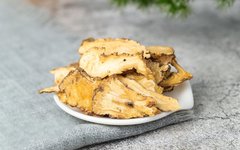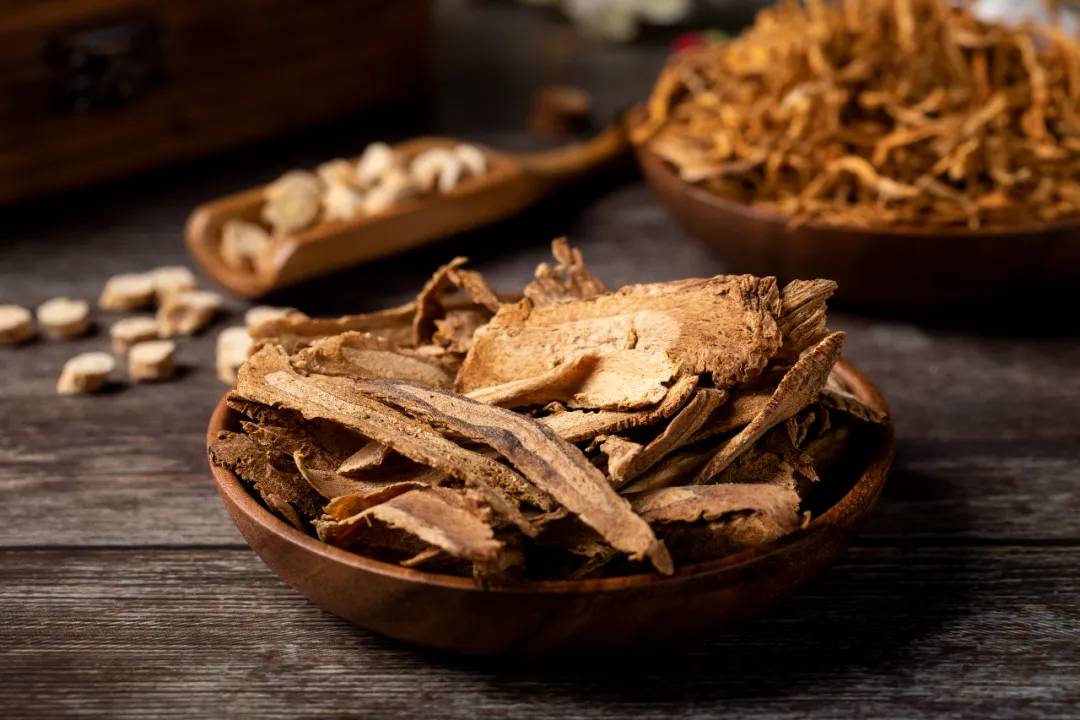


Generally, Dang Gui (Angelica Sinensis) is considered sweet and pungent, warm in nature, with a rich flavor. Its functions include nourishing blood, regulating menstruation, alleviating pain, and moistening dryness to promote bowel movements. Clinically, it is often used for irregular menstruation, dysmenorrhea, blood stasis causing pain, carbuncles, numbness due to blood stasis, blood deficiency leading to pallor, and constipation due to blood dryness.
The Shen Nong Ben Cao Jing states that Dang Gui “is primarily used for cough and counterflow of qi,” which is often overlooked today, hence the need for detailed discussion.



 Why is Dang Gui considered a key herb for cough and counterflow of qi?
Why is Dang Gui considered a key herb for cough and counterflow of qi?

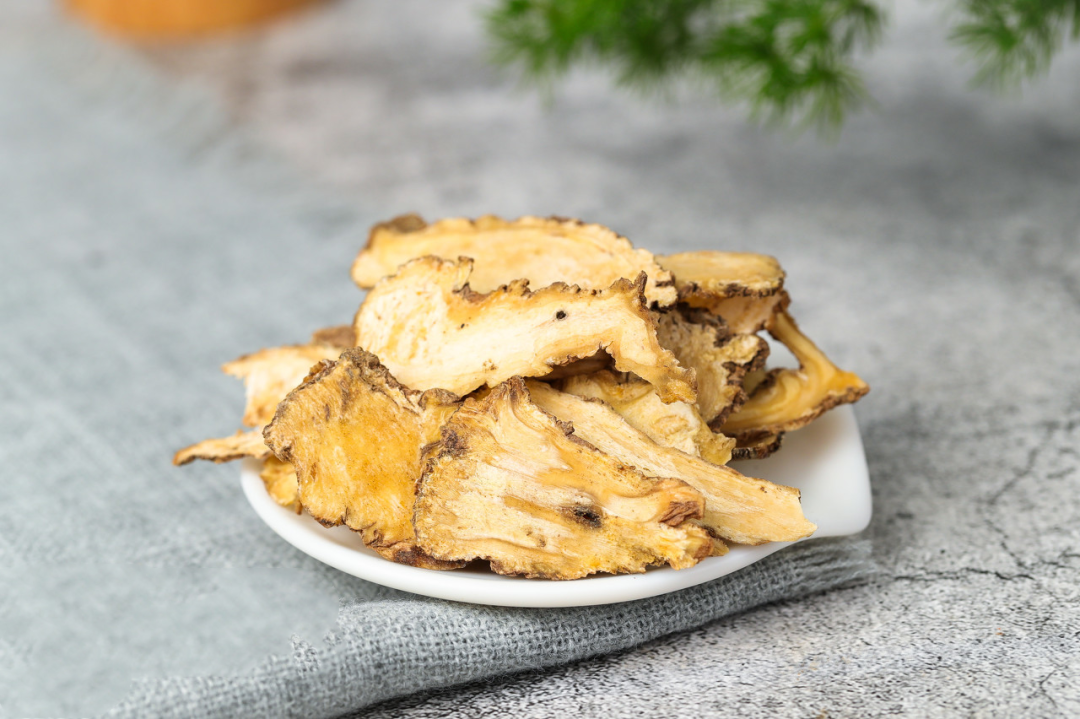
Cough and counterflow of qi can be classified into new and chronic conditions. Generally, new conditions are related to qi, while chronic conditions involve the meridians and blood. However, qi is the commander of blood, and blood is the mother of qi. Even if a new condition is primarily related to qi, it can still affect the blood.
Therefore, for new conditions where the pathogen is indeed in the qi, Dang Gui can be used to harmonize qi and blood, enhancing their mutual benefits; for chronic conditions where the blood is unbalanced and qi is counterflowing, Dang Gui can harmonize and regulate the blood, thus restoring the flow of qi.
The Ben Cao Hui Bian states: “Dang Gui has a pungent and dispersing flavor, making it a qi herb in the blood. Moreover, for cough and counterflow of qi, if there is yin deficiency with no support, using blood herbs to nourish yin will harmonize the blood and lower the qi.”
Dryness in the lungs can also cause cough. Dang Gui “moistens the internal organs (due to its rich and sweet liquid)… thus it can moisten the dryness of the lung metal, which is why the classic states it is used for cough and counterflow of qi.” (Yi Xue Zhong Zhong Can Xi Lu)
All organs can cause cough, not just the lungs.
If liver qi stagnation invades the lungs causing cough, Dang Gui nourishes the liver and harmonizes the blood, relieving liver stagnation; if the heart is damaged and blood is stagnant, it can cause cough from the heart; Dang Gui nourishes blood and supports the heart, invigorating blood and resolving stasis; if kidney yin is insufficient, leading to cough due to deficiency of metal and water, Dang Gui nourishes blood and supports the liver, allowing essence and blood to mutually generate; if there is insufficient blood in the Chong and Ren meridians, causing qi to counterflow and invade the lungs, Dang Gui can nourish blood to fill the Chong and Ren, thus treating it.

 Examples of Clinical Formulas
Examples of Clinical Formulas

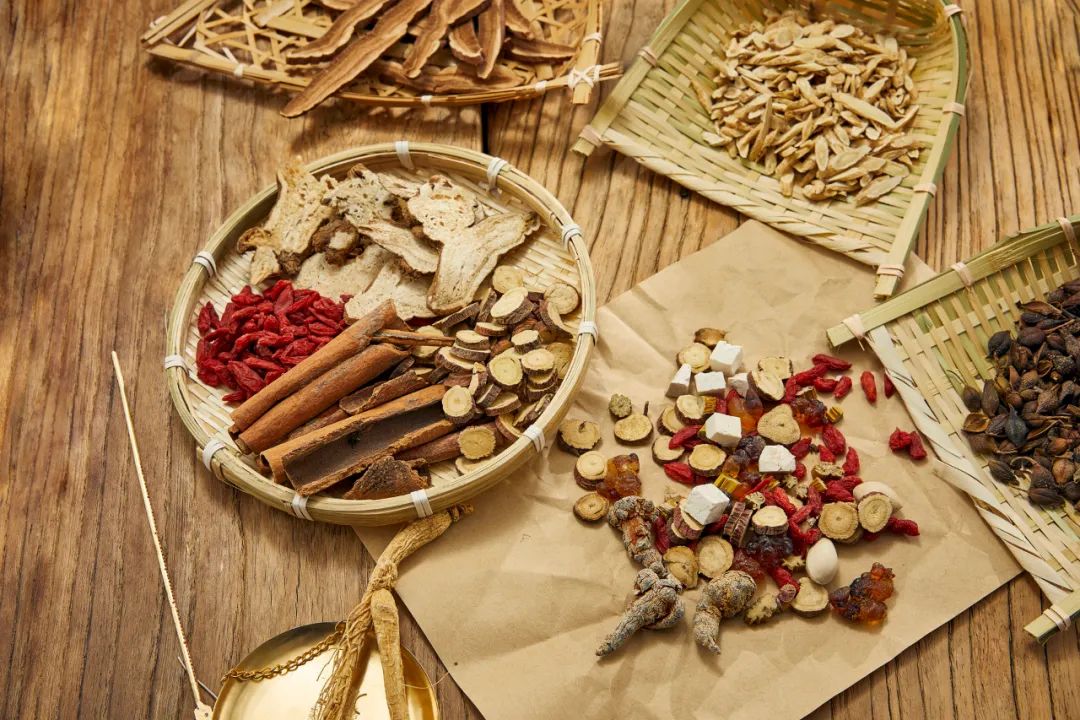
1. Jin Shui Liu Jun Decoction
Dang Gui (2 qian), Shu Di Huang (Rehmannia glutinosa) (3-5 qian), Chen Pi (tangerine peel) (1.5 qian), Ban Xia (Pinellia ternata) (2 qian), Fu Ling (Poria) (2 qian), Zhi Gan Cao (honey-fried licorice) (1 qian), Sheng Jiang (fresh ginger) (3-5 slices)
Decoct in water. Treats lung and kidney deficiency with cold, leading to phlegm formation, symptoms include cough, nausea, wheezing, and excessive phlegm with a salty taste. (Jing Yue Quan Shu)
2. Dang Gui Decoction
Su Mu (Sappan wood), Dang Gui, Sheng Di Huang (Rehmannia glutinosa), Da Huang (rhubarb), and Shao Yao (Paeonia lactiflora) in equal parts, ground into powder. Take 3 qian with warm wine. Treats cough due to lung qi damage or coughing up blood. (De Xiao Fang)
3. Ren Shen Qiong Gui Decoction (from Zhi Zhi Fang)
Treats deficiency of blood and fluids, internal consumption, and self-ignition of heart fire. Dry heat invading the lungs, causing cough with blood, and blood not nourishing the muscles, leading to cough with chills.
Dang Gui, Chuan Xiong (Ligusticum chuanxiong), Bai Shao (white peony) (1 fen each), Ren Shen (ginseng), Ban Xia, Zhi Ju Pi (tangerine peel), Chi Fu Ling (red poria), E Jiao (gelatin) (fried), Xi Xin (Asarum), Bei Wu Wei Zi (Schisandra chinensis), Gan Cao (honey-fried) (1 fen each), ground into powder. Take 3 qian with 4 slices of ginger and 2 jujubes, decoct and take. (Pu Ji Fang)
4. Ping Qi Decoction
Treats all types of cough, phlegm, aversion to wind, and inability to eat.
Ren Shen, Bai Zhu (Atractylodes macrocephala), Chuan Xiong, Dang Gui, Wu Wei Zi, Gan Cao (honey-fried) (1 fen each), Mu Guo (dried papaya), Zi Su Zi (fried), Fu Shen (Poria), Wu Yao (remove wood), Xing Ren (apricot kernel, remove skin and tip, fried), Gui Xin (cinnamon heart), Bai Zhi (Angelica dahurica) in equal parts.
Ground into powder, take 2 qian with 1 cup of water, 3 slices of ginger, and 1 jujube, decoct for 7 minutes, take warm. (San Yin Fang)
5. Jia Wei Xiao Yao San
Treats cough in children, especially when they cough repeatedly for dozens of times, due to disharmony of liver blood.
Dang Gui (2 qian), Bai Shao (2 qian), Fu Ling (3 qian), Chai Hu (Bupleurum) (2 qian), Wei Jiang (ginger) (2 qian), Bo He (mint) (1 qian), Dan Shen (Salvia miltiorrhiza) (2 qian), Xiang Fu (Cyperus rotundus) (2 qian), Ban Xia (2 qian), Huang Qin (Scutellaria baicalensis) (2 qian), Wu Wei Zi (Schisandra chinensis) (7 fen), Dan Pi (Moutan) (2 qian), Bai Zhu (2 qian), Gan Cao (1 qian). (Yi Xue Jian Neng)
6. Qin Jiao Decoction
Treats cough due to deficiency, cold, and heat with night sweats.
Qin Jiao (remove root), Gan Cao (honey-fried) (1 liang each), Gui (remove coarse skin), Chai Hu (remove root), Dang Gui (sliced) (5 qian each).
Coarsely crush and sift, take 3 qian with 1 cup of water. Add 3 slices of ginger, 1 piece of dried plum, and 1 jujube, decoct until 7 minutes, remove dregs and take warm. (Pu Ji Fang)
7. For women with deficiency and weak qi, cough, wheezing, and fullness in the chest, Hou Po Liu He Decoction is recommended.
Four Substance Decoction (Si Wu Tang) (4 liang), Hou Po (Magnolia officinalis) (1 liang, processed), Zhi Shi (bitter orange) (0.5 liang, stir-fried) (Pu Ji Fang)
8. Su Zi Jiang Qi Decoction (from He Ji Ju Fang)
Treats excessive phlegm, cough, wheezing, shortness of breath, fullness and oppression in the chest, and white slippery tongue coating.
Su Zi (Perilla frutescens) (2.5 liang), Qian Hu (Peucedanum) (1 liang), Chen Pi (1 liang), Ban Xia (2.5 liang, processed), Rou Gui (cinnamon) (1 liang), Hou Po (1 liang), Dang Gui (1 liang), Sheng Jiang (3 slices), Gan Cao (2 liang, honey-fried) ground into coarse powder, take 2-3 qian, decoct in water, take warm, twice daily. (Li Dai Ming Yi Liang Fang Zhu Shi)

 Case Examples
Case Examples

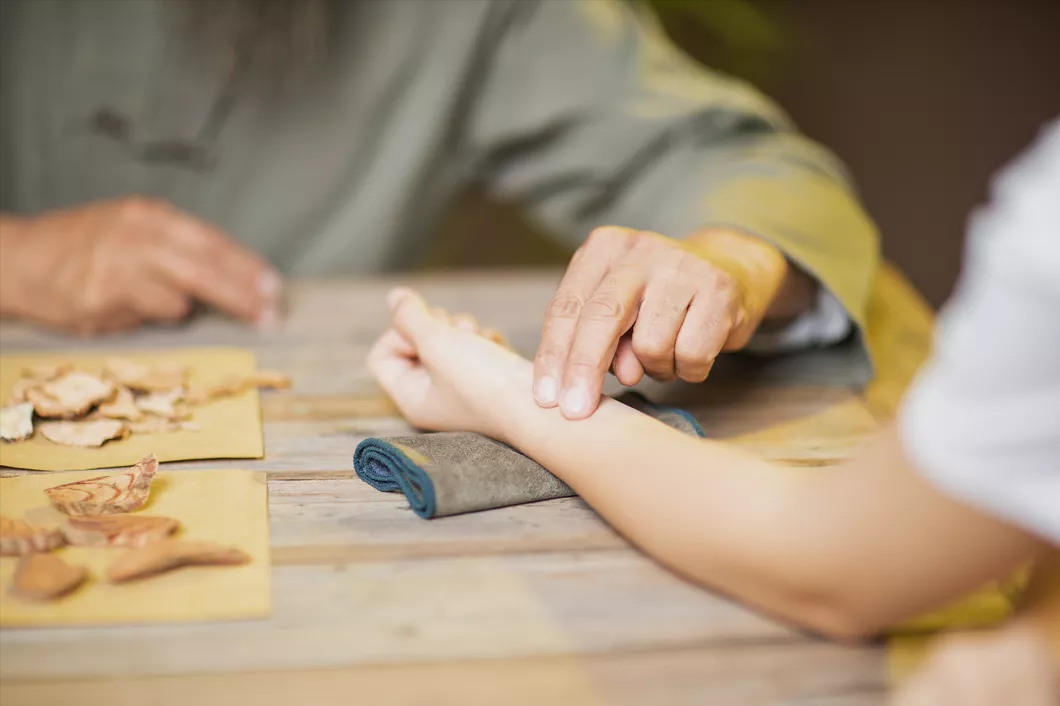
Case 1:
In the case of Li Chenghuai’s wife, she suddenly experienced wheezing, rapid breathing, and was unable to elevate her chest or swallow, with her airways obstructed, which was very dangerous. She had phlegm counterflow and qi stagnation, and wanted to use Niu Huang Su He Wan but was afraid to take it.
Upon pulse examination, her pulse was thin and weak, indicating liver and kidney deficiency, with a lack of coordination between the two, leading to a qi collapse syndrome.
Used 1 liang of Ren Shen (ginseng), 2 liang of Shu Di Huang (Rehmannia glutinosa), 5 qian of Dang Gui, and 2 qian of Gan Cao (honey-fried). After one dose, her condition stabilized, and after two doses, her wheezing improved. For those with shortness of breath resembling wheezing, people often think the problem is above, not realizing that the root cause is below, leading to misdiagnosis and danger. (Xu Ming Yi Lei An)
Commentary: In this formula, Dang Gui combined with Shu Di Huang nourishes the kidney to generate metal, filling the Chong and Ren to lower the counterflow of qi, thus allowing qi to descend. Blood and qi are interdependent; in cases of “qi collapse syndrome,” blood must also be deficient, hence the pulse is thin and weak. Dang Gui combined with Ren Shen strongly nourishes qi and blood, harmonizing blood and filling qi, leading to a peaceful state.
Case 2:
A woman from Dong District in Fengtian, recently married and widowed, returned to her mother’s home. She was proficient in English, and the British merchants in Fengtian invited her to teach their families. However, she fell ill and suddenly lost her ability to speak at night, urgently seeking help from the clinic but could not be calmed.
One of the residents, Wang Zigang, a student of the clinic, had previously diagnosed her pulse and knew her qi was very weak, thus he directly diagnosed her with a significant descent of qi in the chest, unable to control the lung’s breathing, leading to her inability to speak.
Urgently prescribed a formula with 1 liang of Sheng Qi (astragalus), 4 qian of Dang Gui, and 2 qian of Sheng Ma (Cimicifuga) to be decocted, and she was able to speak shortly after.
The next morning, upon examination, her pulse was deep, slow, and weak, and her breathing still felt short. The original formula was adjusted by reducing Sheng Ma by half and adding 3 qian of Shan Yao (Chinese yam) and Zhi Mu (Anemarrhena asphodeloides), and 0.5 qian of Chai Hu (Bupleurum) and Jie Geng (Platycodon grandiflorum), and after taking several doses, she recovered. (Yi Xue Zhong Zhong Can Xi Lu)
Commentary: The significant descent of qi in the chest leads to the lung’s loss of its respiratory function, thus treatment should focus on filling the large qi, hence the heavy use of Sheng Qi, supplemented with Sheng Ma to lift the descent. However, qi is the commander of blood; when qi descends, blood follows, thus Dang Gui is used to fill and harmonize, allowing qi to fill and blood to harmonize, thus restoring the lung’s respiratory function.
In summary, the Shen Nong Ben Cao Jing states: Dang Gui “is primarily used for cough and counterflow of qi,” which is indeed reasonable. Its use is well-founded, as evidenced by clinical cases. The ancients used it to treat this condition, whether due to cold, heat, deficiency, or excess, internal injury, or external pathogens, thus it should not be limited to simply nourishing deficiency. Today, not using Dang Gui for cough and counterflow of qi is not understanding the true essence of its use in the Ben Jing.

⊙ The content of this article is for clinical reference only; non-TCM professionals should not attempt to self-medicate.
⊙ Some images and texts are sourced from the internet; if there is any infringement, please contact us for removal.
⊙ For TCM consultation, please add WeChat ID: daojiaoh
⊙ For submissions and collaborations: [email protected] (original submissions are welcome)

